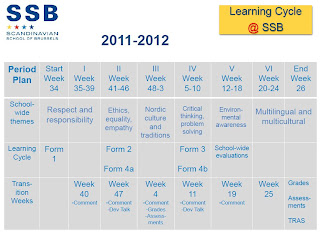A Post on Student Achievement Best Practices
By Kristy Lundström, Head of School, Scandinavian School of BrusselsHow can we plan in a way that leads to better learning? How do we involve students more in their own learning? How do we stay focused on the learning goals, both the schoolwide and the specific course goals? These are the important questions we asked ourselves last spring. We knew we wanted more structure. We knew we wanted more focus. We knew we wanted our students to be empowered to take charge of their own learning.
So, we established Period Planning @ SSB. Based on the idea of focusing on fewer goals in a shorter period with frequent feedback, we broke up the school year into 6 six-week periods with a startup and end week.
Our first step was to identify schoolwide goals for each period. These are the goals that permeate our learning at all times - empathy, respect, equality, problem-solving, and more. Of course, we will not only work with these goals for five weeks and then forget about them . . . instead we focus on specific parts each period, but all are important all of the time.
Next, we created a structure for all teachers to use as they plan their courses. The planning document requires the teacher to highlight the exact curricular goals to be met each period and explain how the complicated language of the national curricula could be translated so that the students can understand. Then, together with the students, teachers are required to write down what methods they will use, how the students will be assessed, and how we will document the progress of each student.
 |
| click to enlarge |
 |
| click to enlarge |
One example is in Norway, vurdering for læring.
There is a large body of research supporting formative assessment. Maybe the most impressive is John Hattie's work that cites this type of continual feedback to students and using this information to influence the next phase of learning can increase the students' results by as much as 99%!
We have completed 4 periods and are now evaluating the process to make improvements for next year. It hasn’t been completely problem-free . . . students were not used to the process and were untrained in self-assessment, teachers want even more time to assess before they plan for the next period of learning, and transition weeks are totally crazy.
But, we all agree – everyone is more tuned in to “what we are learning – specifically . . . right now”. Has student achievement improved? Stay tuned, national exams start in two weeks!
Kristy Lundström, Head of School
Scandinavian School of Brussels
www.ssb.be
Kristy is a school leader focused on learning – where does it happen, when does it happen, how can we make it happen? She is interested in instructional technology and varied methods – so that all students can experience real and relevant learning. She has worked as a mathematics and computer science teacher and as a school leader in the US, Sweden, and now at the Scandinavian School of Brussels in Belgium. Follow her blog at www.everyonelearnseveryday.wordpress.com.



No comments:
Post a Comment